
The Formula 3000 International Championship was a motor racing series created by the Fédération Internationale de l'Automobile (FIA) in 1985 to become the final preparatory step for drivers hoping to enter Formula One. Formula Two had become too expensive, and was dominated by works-run cars with factory engines; the hope was that Formula 3000 would offer quicker, cheaper, more open racing. The series began as an open specification, then tyres were standardized from 1986 onwards, followed by engines and chassis in 1996. The series ran annually until 2004, and was replaced in 2005 by the GP2 Series.
Lola Cars Limited is a British automobile manufacturer founded in 1958 by Eric Broadley in Bromley, England. The company is now owned by Till Bechtolsheimer, which he purchased in 2022. Lola Cars endured for more than fifty years to become one of the oldest and largest manufacturers of racing cars in the world. Lola started by building small front-engine sports cars, and branched out into Formula Junior cars before diversifying into a wider range of sporting vehicles. In 2012, Lola Cars stopped operations. Lola is set to make a return to motorsport in 2024 by joining the Formula E World Championship as a powertrain supplier in a technical partnership with Yamaha with Abt as their customer.
Adrian John Reynard is a businessman and commercial astronaut. He is the founder of Reynard Motorsport, which was a successful racing car manufacturer before it went bankrupt in 2002.

Judd is a brand of racing car engines built by Engine Developments Ltd., a company founded in 1971 by John Judd and Jack Brabham in Rugby, Warwickshire, England. Engine Developments was intended to build engines for Brabham's racing efforts, and became one of the first firms authorised by Cosworth to maintain and rebuild its DFV engines, but has since expanded into various areas of motorsport.

Gibson Technology is an automotive and motorsport company based at Repton, Derbyshire, England. It was founded by Bill Gibson and Brian Mason as Zytek Engineering in 1981.
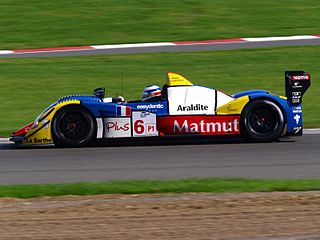
Courage Compétition was a racing team and chassis constructor company now owned by Oreca, based in Le Mans, France, near the Circuit de la Sarthe. It was founded by Yves Courage, a French race driver who ran hillclimbs before founding the company. Following the purchase of Courage by Oreca in 2007, Yves Courage has refounded the company as Courage Technology in 2010, attempting to develop electric racing cars.
Advanced Engine Research, Ltd. is an auto racing engine manufacturer based in Basildon, Essex, England. Established in 1997, AER has developed winning engines for a number of high-profile international race series in sports car, prototype racing, rallying, touring car, and open wheel racing. They have designed engines derived from road car platforms, but their emphasis is on clean sheet designed engines with a focus on electronics and turbochargers. Their engines have raced in the 24 Hours of Le Mans, the World Endurance Championship (WEC), the European Le Mans Series (ELMS), the IMSA SportsCar Championship, GP3, British Touring Car Championship (BTCC), Nissan/Renault World Series, Grand-Am, Paris Dakar and FIA Sportscar Championship. They have worked with a number of manufacturers including Mazda, Ford, Hyundai, MG/Rover, Nissan, and Toyota. In 2012, AER developed and built Formula One turbo test engines to current rules and in July 2012, AER was chosen as engine partner and supplier to the new GP3 racing series. They currently supply engines for the Indy Lights series.

Creation Autosportif, Ltd. was a sports car racing team based in Oxford, England. It was founded in 2003 by Ian Bickerton and Mike Jankowski and has raced in the FIA GT Championship, FFSA GT Championship, American Le Mans Series, Le Mans Endurance Series, as well as the 24 Hours of Le Mans. Their cars are known for their blue and yellow paint schemes.

The MG-Lola EX257 is a Le Mans Prototype racing car built by Lola for the MG car company for their attempt to compete again at the 24 Hours of Le Mans in 2001. The car has had many years of mixed success since its introduction, even in privateer hands.

The Lola B2K/10 was a Le Mans Prototype developed in 2000 by Lola Cars International for use in the 24 Hours of Le Mans, American Le Mans Series, Grand American Road Racing Championship, and Sports Racing World Cup. It was a replacement for the previous Lola B98/10 and shared some elements with its smaller variant, the Lola B2K/40.

The Lola B05/40 is a Le Mans Prototype built by Lola Cars International for use in the LMP2 class for the American Le Mans Series, Le Mans Series, and 24 Hours of Le Mans. Developed in 2005, it was intended as a replacement for both the Lola B2K/40 and the MG-Lola EX257. It shares various structural elements with the larger LMP1-class Lola B06/10.

The Lola B06/10 is a Le Mans Prototype developed by Lola Cars International for use in the LMP1 class of the American Le Mans Series, Le Mans Series, and 24 Hours of Le Mans. It was developed in 2006 as a replacement for the Lola B2K/10 as well as the MG-Lola EX257. It shared much of its mechanical elements and design with the LMP2 class Lola B05/40, which was developed the year prior.
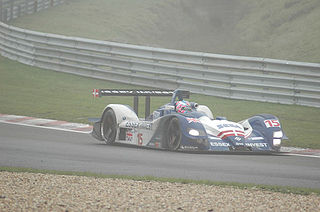
The Reynard 02S was a Le Mans Prototype race car built by Reynard Motorsport in 2002. Intended to replace the failed Reynard 2KQ prototype, the 02S would end up becoming the final new design from Reynard as the company went bankrupt prior to the project's completion.
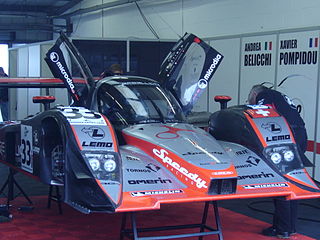
The Lola B08/80 is a Le Mans Prototype built by Lola Cars International. It is effectively the LMP2 version of the larger Lola B08/60; they are the first closed-cockpit sports prototypes built by Lola since the T92/10 of 1992. The B08/80 is optimised for the smaller engines and lighter weight of the LMP2 category in comparison to the larger and heavier B08/60.
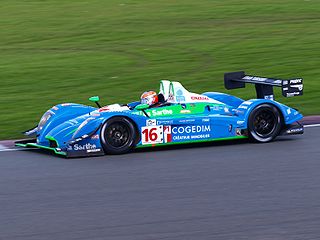
The Pescarolo 01 was the first sports prototype racing car built entirely by French team Pescarolo Sport. It had been designed to meet the LMP1 and LMP2 regulations for Le Mans Prototypes in the Le Mans Series as well as at the 24 Hours of Le Mans, and replace Pescarolo's previous C60 chassis which had been heavily modified from cars purchased through Courage Compétition. The 01s debut was at the 2007 1000 km of Monza.

Reynard Motorsport was the world's largest racing car manufacturer in the 1980s. Initially based at Bicester and latterly at Reynard Park, Brackley, England the company built successful cars in Formula Ford 1600, Formula Ford 2000, Formula Vauxhall Lotus, Formula Three, Formula 3000 and CART.
Intersport Racing is a former American auto racing team founded by Jon Field. The team was based in Dublin, Ohio. They previously operated two Oreca FLM09 sports cars in the American Le Mans Series. At current, the company has transitioned into diet supplements.
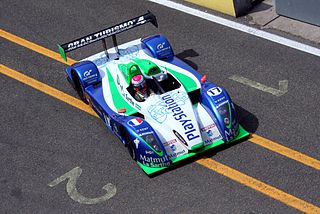
The Courage C60 was a Le Mans Prototype (LMP) racing car built by Courage Compétition in 2000, and used in international sports car races until 2006. A replacement for the Courage C52, it was Courage's first all-new prototype since the Courage C41 was built in 1994.
Louis "Wiet" Huidekoper was a Dutch racecar designer and former technical director for the Opel DTM programme. His major career was in the international sports car racing arena.

The Courage LC70 is a Le Mans prototype of the LMP1 class developed by Courage Competition and used in sports car racing since 2006. The name Courage remembers F1 driver Piers Courage. During development, however, Courage Compétition has been taken over by ORECA, so the original name Courage LC70 has been changed. The Courage-ORECA LC75 is almost identical in construction but was designed for the LMP2 class. Other modifications of the LC75 are the Acura ARX-01a and Acura ARX-01b, which has been used in the American Le Mans Series since 2007. The type designation LC stands for Lillian Courage, the wife of Yves Courage who died in 2004.














